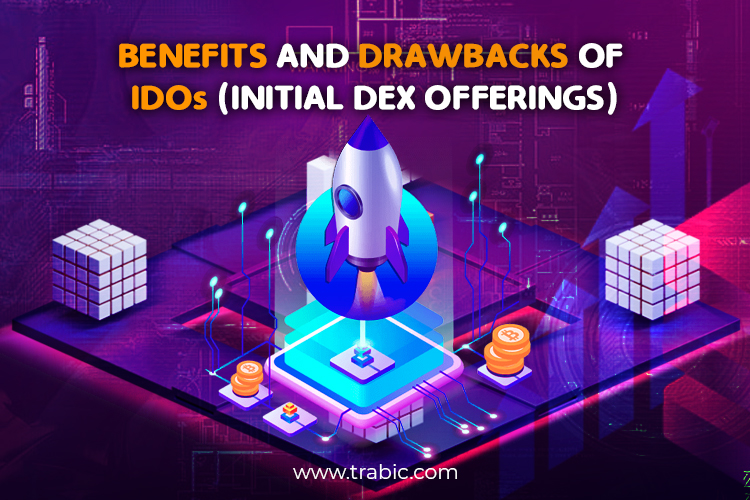What are IDOs (Initial DEX Offerings)?
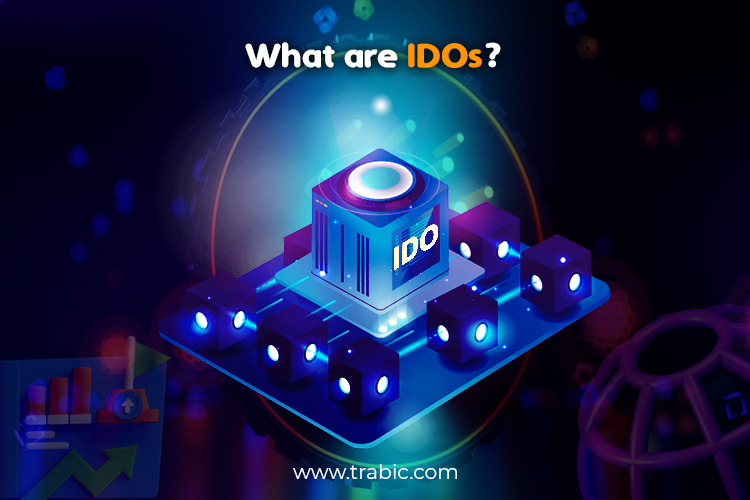
IDOs, or Initial DEX Offerings, are a new fundraising method that allows projects to raise capital by issuing tokens directly on decentralized exchanges (DEXs) rather than traditional centralized exchanges. Initial DEX Offerings are similar to Initial Coin Offerings (ICOs) because they allow projects to raise funds by issuing tokens.
However, they differ in that they are conducted on decentralized platforms, which provide more transparency and security for investors. An Initial DEX Offering typically begins with a whitelisting process, where interested investors must pass a Know-Your-Customer (KYC) and Anti-Money Laundering (AML) check to be eligible to participate in the offering. Once whitelisted, investors can buy tokens using the native cryptocurrency of the DEX platform, such as Ethereum.
Initial DEX Offerings have several advantages over traditional fundraising methods. For one, they allow projects to raise funds easily and rapidly without any need for intermediaries such as venture capitalists or investment banks. It allows for a more inclusive fundraising process, as anyone with an internet connection can participate. However, it also have several disadvantages, such as a deficiency of ordinance and management, which can lead to increased risk for investors.
Additionally, it can be highly speculative and volatile, with tokens often experiencing significant price fluctuations in the days and weeks following the offering. Initial DEX Offerings are a new and exciting development in cryptocurrency, but they come with risks and considerations. As such, investors must do their due diligence and thoroughly research the projects they are considering investing in before participating in it.
How are IDOs related to IEOs and ICOs?
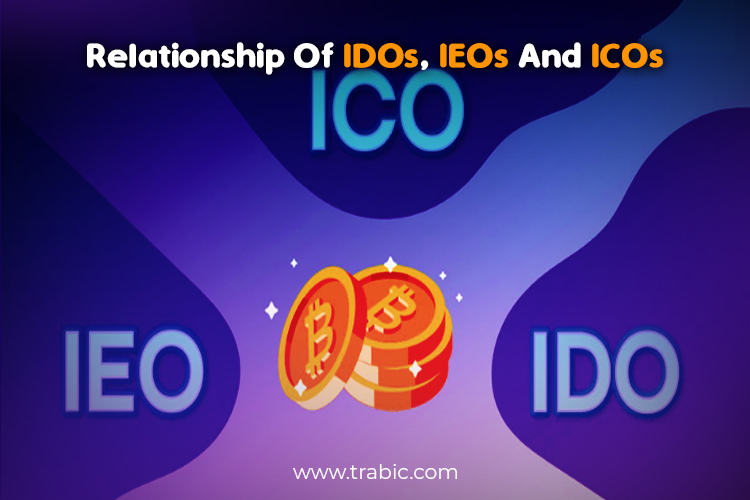
IDOs, IEOs, and ICOs are all initial coin offerings and fundraising mechanisms for new cryptocurrency projects. IDO stands for Initial DEX Offering, a fundraising event for a new cryptocurrency project on a decentralized exchange (DEX). Initial DEX Offerings differ from IEOs and ICOs because they allow investors to purchase tokens using cryptocurrency rather than fiat currency.
IEO stands for Initial Exchange Offering, a fundraising event for a new cryptocurrency project on a centralized exchange. IEOs differ from IDOs and ICOs in that they are conducted and managed by the exchange itself, providing a level of scrutiny and due diligence that can increase investor confidence.
ICOs, or Initial Coin Offerings, refer to a fundraising means by which further projects market their underlying cryptographic tokens in exchange for bitcoin and ether. It was the first form of fundraising for crypto projects.
All three types of initial coin offerings are similar in that they allow investors to purchase tokens in a new project in its early stages, with the expectation that the value of the tokens will increase as the project develops and gains traction. However, IDOs, IEOs, and ICOs differ in structure, regulatory compliance, and level of scrutiny. Investing in an Initial DEX Offering or Initial Decentralized Offering is a relatively new concept in cryptocurrency and blockchain. Here are the fundamental steps to follow when investing in Initial DEX Offering:
Research: It is vital to research the project and its team before investing thoroughly. Look at the project’s whitepaper, website, and social media pages to understand what it is about and the team’s goals. It would benefit if you also skimmed for information about the token’s use case, tokenomics, and the smart contract.
Get a wallet: To participate in Initial DEX Offering, you will require a wallet compatible with the decentralized exchange where the IDO is taking place. Some popular wallet options include MetaMask, MyEtherWallet, and Trust Wallet.
Whitelist: Many Initial DEX Offerings require interested investors to register for a whitelist in order to participate. The whitelist is a way for the project to ensure that only qualified investors can participate.
KYC/AML: Initial DEX Offerings typically require participants to complete a Know Your Customer (KYC) and Anti-Money Laundering (AML) process to confirm their identity and ensure compliance with regulations.
Fund your wallet: Once you have a wallet and have completed the whitelisting and KYC/AML process, you will need to fund your wallet with the cryptocurrency that the Initial DEX Offering accepts.
Participate in the IDO: When the Initial DEX Offering is live, you can participate by sending the required amount of cryptocurrency to the smart contract address provided by the project.
Wait for the tokens to be distributed: After the Initial DEX Offering is complete, the tokens will be distributed to participants’ wallets. It is important to note that IDOs are high-risk investments, and it is essential to be well-informed before participating. The prices of tokens in IDOs tend to be highly volatile and may experience significant fluctuations.
The advantages of IDOs
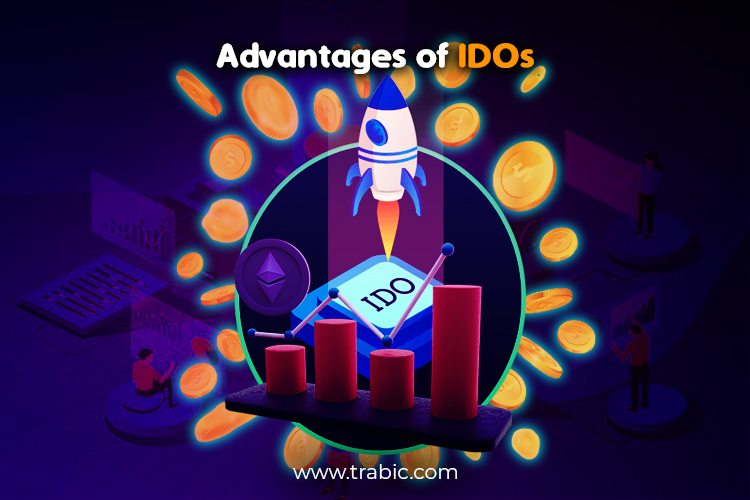
The main difference between Initial DEX Offerings and traditional ICOs and IEOs is that Initial DEX Offerings are launched on decentralized rather than centralized exchanges. Initial DEX Offerings offer a more decentralized and open fundraising process, as anyone can participate without going through a centralized intermediary. It offers a more decentralized and open fundraising process than traditional ICOs and IEOs, offering benefits such as accessibility, lower barriers to entry, more efficient fundraising, and increased investor protection. Benefits of Initial DEX Offerings include:
Decentralization
Initial DEX Offerings are launched on decentralized exchanges, which are more open and transparent than centralized exchanges. This means anyone can participate in the offering without going through a centralized intermediary. One of the main differences is that IInitial DEX Offerings DOs are launched on decentralized exchanges (DEXs) rather than centralized exchanges. This means the fundraising process is more open and decentralized, as anyone can participate without going through a centralized intermediary. This can make the process fairer, eliminating the need for whitelists or other forms of centralized control.
Another benefit of Initial DEX Offerings is that they are typically launched on smart contract platforms, such as Ethereum, which can provide more transparency and security for investors. This is the reason that all transactions made on the blockchain are registered on a public ledger, and the smart contract code can be audited to ensure that it functions as intended.
Additionally, Initial DEX Offerings often have a more community-driven approach, with projects engaging with their potential investors, supporters, and users in a way that is more open and transparent; this can lead to a more engaged and informed community which can be beneficial for the projects. In summary, Initial DEX Offerings offer a more decentralized and open fundraising process than traditional ICOs and IEOs, launching on decentralized exchanges, which can provide more transparency, security, and fairness for investors.
Accessibility
Initial DEX Offerings are accessible to a broader range of investors. Initial DEX Offerings are accessible to a more comprehensive range of investors because they are launched on decentralized exchanges, which are more open and transparent than centralized exchanges. Anyone with an internet connection and a wallet can participate in the offering.
Additionally, Initial DEX Offerings are typically launched using a token or a smart contract, allowing for a more decentralized and open fundraising process than traditional ICOs and IEOs. This allows investors worldwide to participate in the fundraising process, regardless of location or accreditation status.
Lower barriers to entry
IDOs have lower barriers to entry for new projects, as they do not require a large amount of capital to launch. Initial DEX Offerings have lower barriers to entry for new projects because they do not require a large amount of capital to launch. This is because Initial DEX Offerings are typically launched on decentralized exchanges, which are more open and transparent than centralized exchanges.
Decentralized exchanges do not require much capital and typically have lower listing fees than centralized exchanges. This allows new projects to launch an Initial DEX Offering with less capital, making it more accessible for early-stage projects and startups. Additionally, IDOs are typically open to a broader range of investors, as anyone with an internet connection and a wallet can participate in the offering, which increases the potential pool of investors for the project.
More efficient fundraising
IDOs allow projects to raise funds more efficiently, reaching a more comprehensive range of investors and raising funds faster. This is accomplished by eliminating the need for intermediaries and allowing for a direct connection between the project and its investors. This can also lead to lower project costs and higher returns for investors. Additionally, Initial DEX Offerings typically have a faster fundraising process than traditional methods, as they are not subject to the exact regulatory requirements and can be launched more quickly. This allows projects to raise funds and begin their development faster.
Increased investor protection
IDOs offer increased investor protection, as they are based on smart contracts that automatically enforce the terms of the offering. IDOs offer increased investor protection by allowing anyone with an internet connection and a wallet to participate in the offering. This can help to increase the number of participants and reduce the risk of fraud or manipulation.
Additionally, IDOs are launched on decentralized exchanges, which are more open and transparent than centralized exchanges. This increased transparency can help to increase investor confidence and reduce the risk of fraud or manipulation. Additionally, the decentralized nature of IDOs can ensure that the funds raised are used for the intended purpose, as the community can more easily monitor the project’s progress.
The disadvantages of IDOs
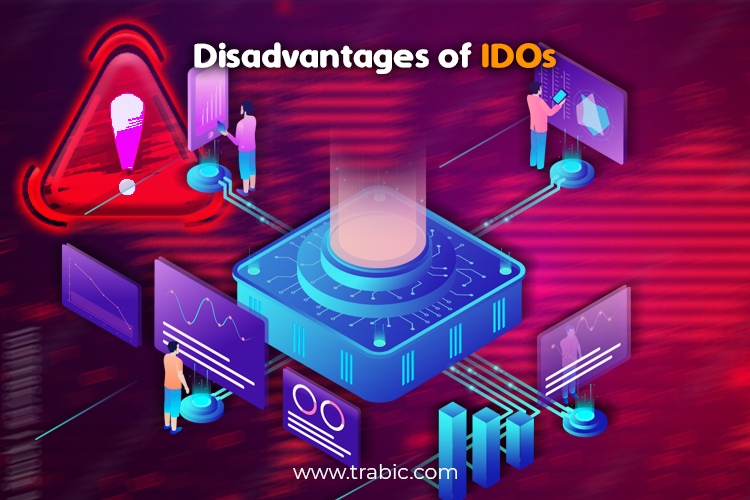
Some potential disadvantages of IDOs include the following:
Regulation and oversight
Lack of regulation and oversight can increase the risk of fraud or manipulation. IDOs, like other forms of cryptocurrency fundraising, such as ICOs and IEOs, are not currently subject to regulation in many jurisdictions. This lack of law and oversight can direct to several disadvantages for investors, including increased risk of fraud or manipulation, investor protection, and transparency.
Additionally, the decentralized nature of IDOs may make it more difficult for regulators to oversee and intervene in the market if necessary. As a result, investors in IDOs may be exposed to higher levels of risk than they would be in more traditional, regulated markets.
Investor protection
Lack of investor protection, as investors may have different rights and protections than they would in a traditional securities offering. IDOs, like many other forms of cryptocurrency fundraising, operate in a largely unregulated environment. This means that there needs to be more oversight to ensure that projects are legitimate and that investor funds are used appropriately.
Additionally, since IDOs are typically conducted on decentralized exchanges, there may be a need for more recourse for scammed or defrauded investors. This lack of investor protection can make IDOs a high-risk investment opportunity, especially for novice investors.
Information and transparency
Lack of information and transparency, as projects may not be required to disclose financials or other important information. IDOs, like other forms of initial coin offerings, can cause a lack of information and transparency due to the lack of oversight and regulation in the crypto market. This can make it difficult for investors to properly evaluate the projects and teams behind them and improve the chance of fraud or manipulation.
Additionally, IDOs can be less transparent than centralized exchanges, making it harder for investors to understand the underlying forces driving price movements and evaluate the market’s liquidity.
Volatility in prices
Volatility in the price of the offered tokens can lead to significant losses for investors. IDOs can cause volatility in the prices of the tokens because they are a relatively new and emerging form of fundraising, and the market for these tokens still needs to be fully established. The lack of regulation and oversight in IDOs can also contribute to volatility, as there may be little to no oversight of the projects or the trading of the tokens.
Additionally, IDOs often raise funds quickly, and the projects may need a fully developed business plan or a track record of success, which can also contribute to volatility in the prices of the tokens. Furthermore, the lack of information and transparency in IDOs can make it difficult for investors to fully understand the risks and potential returns of investing in the project, which can also lead to volatility in the prices of the tokens.
Illiquidity in the secondary market
Illiquidity in the secondary market for tokens can make it more difficult for investors to sell their tokens after the offering. IDOs (Initial DEX Offerings) can cause illiquidity in the secondary market for several reasons. One reason is that IDOs tend to be smaller and less established projects, which may need more support or interest from investors.
Additionally, IDOs are typically launched on decentralized exchanges, which may have lower trading volumes and liquidity than centralized exchanges. This can make it harder for investors to find buyers or sellers for their tokens, leading to illiquidity in the secondary market. Additionally, since IDOs are new projects and the market is still young, evaluating their long-term potential or track records is challenging, which may result in less liquidity.
A high degree of speculation
A high degree of speculation, as the success of a project, maybe uncertain. IDOs can cause a high degree of speculation because of the market’s lack of regulation and oversight. This can create an environment where investors make decisions based on hype or rumors rather than fundamentals. Additionally, the lack of information and transparency in the market can make it difficult for investors to make informed decisions, which can lead to speculation. This can result in high volatility and illiquidity in the prices of tokens in the secondary market.
The future of IDOs
It is challenging to forecast the future of IDOs as they are a relatively new and evolving concept in the crypto market. However, regulatory oversight will likely increase for IDOs to protect investors and prevent fraud. Additionally, as the market for IDOs matures, it is possible that more established projects will begin to utilize this fundraising method and that the overall quality of projects launching IDOs will improve. Another potential development in the future of IDOs is the emergence of more sophisticated and user-friendly platforms for launching and participating in IDOs.
This could help to increase the accessibility of IDOs to a broader range of investors and projects. However, it is also essential to mention that while IDOs have the potential to democratize access to funding for projects, they also present significant risks. IDOs can be highly speculative, and the market for tokens sold in IDOs can be extremely volatile.
As such, it is crucial for investors to thoroughly research any project before participating in an IDO and only to invest what they can afford to lose. There are several popular IDO launchpads, including:
- Binance Launchpool: Binance’s IDO platform allows users to participate in the launch of new projects by staking Binance Coin (BNB) or other supported cryptocurrencies.
- Polkastarter: A decentralized cross-chain IDO platform that supports projects built on Ethereum, Binance Smart Chain, and more.
- Uniswap: A decentralized exchange that permits users to participate in IDOs by providing liquidity to pools of tokens before they are listed on other exchanges.
- CoinList: A platform that allows users to participate in IDOs by completing a KYC/AML process and depositing funds into a CoinList account.
- Launch base: A decentralized IDO platform that allows users to participate in the launch of new projects by staking tokens from projects that have already launched on the platform.
- Serum: A decentralized exchange that allows users to participate in IDOs by providing liquidity to pools of tokens before they are listed on other exchanges.
- PancakeSwap: A decentralized exchange that allows users to participate in IDOs by providing liquidity to pools of tokens before they are listed on other exchanges.
It is important to note that these launchpads have different rules, fees, and requirements, so it is vital to research each before investing.
